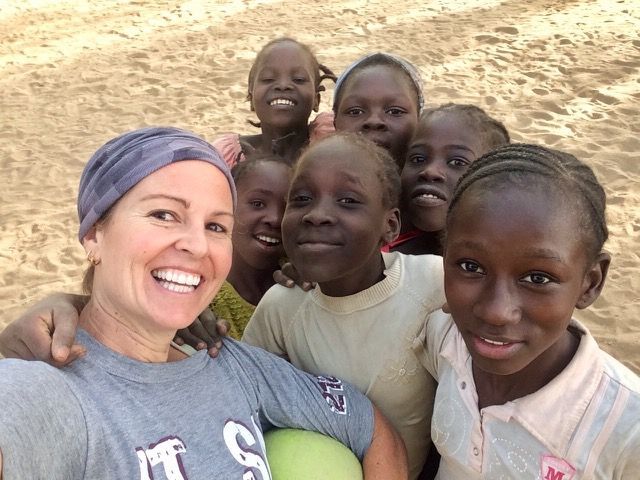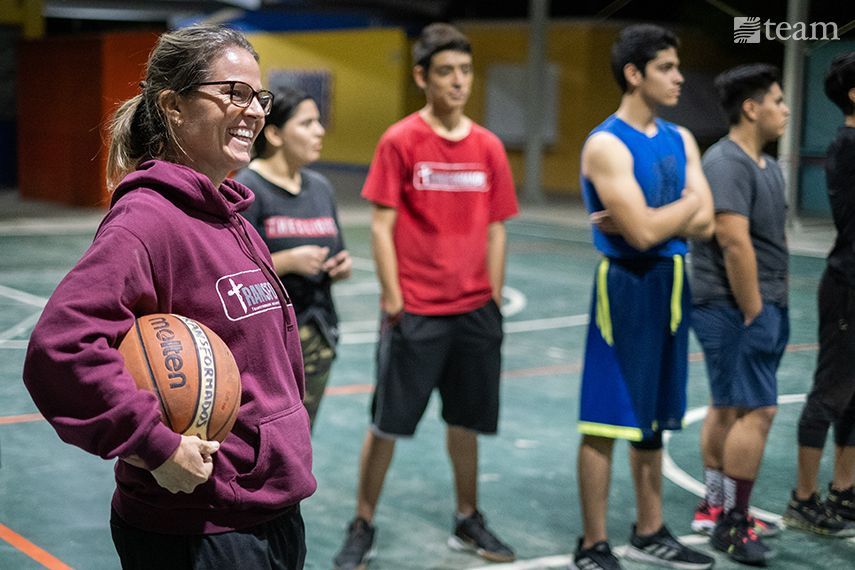I don’t want to be a missionary anymore , Annie Wilson thought.
She’d followed God’s leading and left her P.E. teaching and coaching job to serve Him overseas. So why did it feel like a dead end?
Exploring Missions
Annie began exploring missions in 2014 when she was asked a question: “What would you be willing to give up for God?”
As Annie wrestled with her answer, she discovered TEAM and saw opportunities for sports ministry. TEAM connected her with a missions coach , Tasha Eckenhoff, who worked with her to find a role that would be a good fit.
One option was starting a sports ministry for girls in Chad . Though it was considered a mid-term assignment (two years maximum), Annie would need an extra year to attend language school in France. It also meant Annie would need to raise additional funds.
But if that’s how God was guiding, Annie was okay with it.
Not What She Expected
Annie had some background in Spanish, so learning French seemed manageable. She could see her mid-term experience transitioning to a long-term missionary career in Chad.
But her first year, spent in France learning French , was grueling. Then it was time to learn Arabic in Chad, along with drastic cultural differences to absorb.
When Annie was ready to begin her actual ministry work — setting up a sports program for girls at a local Christian high school — a general strike delayed her placement for months .
While she waited, she worked in a ministry for vulnerable women.
When she was finally able to start at the high school, cultural restrictions and ethnic tensions hobbled her efforts. Eventually, she stopped trying to make the program work.
 Annie thrived in discipling girls, but delays and the local culture made it hard to build a sports ministry for them.
Annie thrived in discipling girls, but delays and the local culture made it hard to build a sports ministry for them.
Annie had started to help teach PE classes at a nearby missionary kid school, which grew into a larger role. She sought out ways to partner with other missionaries.
Annie kept her heart open to serve, but the constant upheaval was wearing her down . She spent many nights in tears, confused about what God was doing.
A World of Opportunity
In early 2018, as the end of her term approached, Annie was ready to be done.
She felt peace about leaving; she’d fulfilled her commitment and she didn’t see any opportunities for someone with her skill set. She set aside time to fast and pray.
When TEAM’s director for Sub-Saharan Africa, Lorraine Green, learned of Annie’s plans to leave mission work, she reached out.
“You don’t have to stay in Chad,” Lorraine told her. “You can still be a missionary. Why don’t we explore other options?”
That resonated, and Lorraine provided Annie with other sports ministry contacts.
“I just saw a world of opportunity,” Lorraine remembers. “There’s always room for a new vision.”
Taking the Next Step

As Annie explored ministry options, she found a sports outreach in Mexico where kids are discipled as they learn various sports.
Tasha reconnected with Annie as she began a new search for where to serve.
Lorraine’s introductions eventually led Annie to Transformados (“Transformed”), a student ministry in La Paz, Mexico, that focused on basketball but was looking to add other sports.
Since she already knew some Spanish, and Mexico was much closer to her California roots, Annie decided to apply for long-term service with TEAM, with Transformados in mind.
Slowing Down to Relaunch
A few months later, Annie returned to California. Her application for long-term ministry meant extensive evaluations, a thorough medical exam, and connecting with her support team.
Annie was also debriefing her difficult first term. Tasha connected Annie with counseling services available through Annie’s church and with TEAM’s member care department .
Member Care’s goal, says director Steve Maybee, is “to support TEAM’s international workers … so that they can realize all the physical, mental, emotional, relational [and] spiritual health that God has for them.”
Sometimes, he says, that means slowing down for a while.
Yet Another Challenge
In the middle of processing and preparing, Annie’s health screenings revealed breast cancer.
Annie’s church surrounded her with prayer and the finances she needed for treatment and follow-up care. Tasha brought TEAM’s medical department on board. Everyone was grateful to learn that Annie’s cancer was Stage 1 and treatable.
“TEAM was just super, super supportive during that time,” Annie says .
Seeing the Joy
Annie remembers a moment during her term in Chad when her perspective began to shift.
During regular times of prayer with her co-workers, she noticed something about one person that stood out.
“She would always give two praises,” Annie remembers, “always, every single time, no matter what — she would give praises.
“And I was like, Gosh, I don’t say a single praise ever.”
The challenges were easy to see : No running water or electricity. No freedom to go for a run in her neighborhood. The head covering and skirt the culture required her to wear. The ever-present threat of riots and terrorist attacks. The poverty and hardship everywhere she looked.
But Annie began to “see the joy,” as she put it , in places she hadn’t noticed it before: A moment when the women she was working with all laughed together. Or when she was teaching volleyball to a group of kids and they actually hit the ball across the makeshift court — even if it did go under the net.
“The challenge there in Chad was really more than any of us had bargained for,” Lorraine remembers. “Annie’s good attitude was a real lifesaver for her and for those who were trying to help her.”
‘An Amazing Journey’
Eight months after Annie returned from Chad, she was healthy and ready to go to Mexico.
After language school , she began serving with Transformados in early 2020 . Annie says it’s been “a breath of fresh air.”
She’d just started to introduce new sports when COVID-19 interrupted everyone’s life.
Annie pivoted from her original plan.

After Annie finally found her ministry fit, COVID-19. But this time, Annie could see how God had prepared her for the challenge — and she’s seen blessings along the way.
“This is what I can take away from my experience in Chad: I just can’t control things, and what I want things to look like aren’t [sic] always going to turn out,” she says.
She’s now teaching fitness, strength training and nutrition to small groups of students.
“As terrible as COVID has been and limited our ministry, I feel like it’s brought me closer to know our youth,” Annie says . “I think it would have taken a lot more time.”
She is encouraged to see how God has changed her perspective, how she’s grown in profound ways.
“I’m a completely different person from five years ago,” she says. “I can easily fall back on [God’s provision] a lot more.”
So she doesn’t regret those hard years at all. In fact, she says, “It’s been an amazing journey.”





















